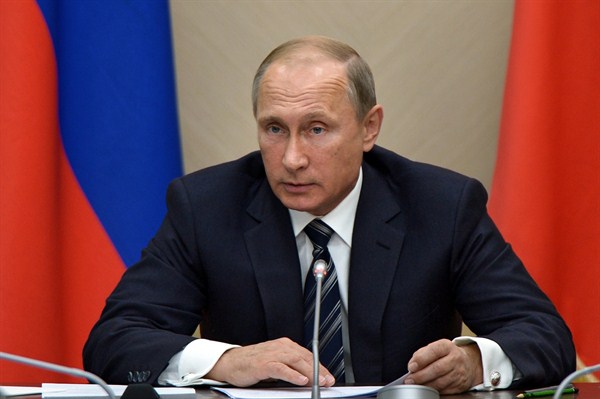Russian President Vladimir Putin’s willingness to use military force in pursuit of national interests in Ukraine and Syria has led some U.S. observers to warn that Russia is now the primary threat to U.S. national security. But Russia’s high-profile, decade-long military modernization program has so far shown mixed results, even as its involvement in Ukraine and Syria has created serious challenges, but no decisive outcome as yet. In the meantime, U.S.-Russia relations have been largely deadlocked as a result.
In the past few years, President Vladimir Putin has worked to reassert Russia’s international influence, in part through a high-profile military modernization program. But despite the funds Moscow has poured into its military, the results have been mixed, leaving Russia with an improved but still limited capacity to project force.
Strategic Posture Review: Russia
In May 2014, Richard Weitz attributed the “remarkable recovery of Russia’s international influence and ambitions” to President Vladimir Putin’s continued pursuit of “a separate agenda aimed at making Russia an important and independent pillar of the global order.” Still, domestic and foreign factors, from the political landscape and ethnic relations to the global economy and its neighbors’ strengths, shape Russia’s strategic posture—and limit its reach.
As the world watched to see whether Putin would seize additional Ukrainian territory in April 2014, Weitz and Vera Zimmerman argued that, despite a half-decade of military modernization efforts, “persistent challenges, now exacerbated by Western sanctions, continue to present barriers to Russia’s ambition to return to superpower status.”
Russia’s swift occupation of Crimea, and ongoing support to separatist forces in eastern Ukraine, attest to its military advances over the past decade, Weitz wrote in April. Nevertheless, the Kremlin continues to face many challenges in its efforts to upgrade its military and defense industry, and realize its “aspirations to become a near-peer competitor of the United States.”
By June, media attention had been focused on Russia’s deployment of ground forces in support of separatists in eastern Ukraine and on its air force’s frequent patrols near NATO members’ airspace. “But the revival of the Russian navy has been another key element of Moscow’s use of military force to press its great power status,” wrote Weitz, potentially challenging the United Sates’ “uncontested naval dominance of the Asia-Pacific and Mediterranean theaters.”
Putin’s Crises: From Ukraine to Syria
Putin’s actions in Ukraine ignited a protracted crisis that put him at odds with the West and could fundamentally reshape Europe. At the same time, he looked toward the Middle East as a region of opportunity. In his latest confrontational maneuver, he abruptly decided to intervene militarily to defend the Bashar al-Assad regime in Syria—a move that might not end up as planned.
In July, Nicolas Gvosdev wrote that the Ukraine crisis had devolved into a status quo, with a tenuous cease-fire keeping alive hopes for a negotiated resolution. But this status quo, he argued, is not sustainable: Within the next year, the future shape of Eastern Europe will be determined, with four possible lines of development.
A series of arms sales and security cooperation agreements with both Iraq and Egypt, and its joint naval exercises with Egypt in the Mediterranean in June, highlight Russia’s efforts to revive its role in the Middle East, wrote Michael Kofman. Russia blames the region’s upheaval on U.S. policy failures and sees an opportunity to step in.
Rather than be shaken by Russia’s military engagement in Syria, the U.S. should be “celebrating,” Michael Cohen argued this week: Entering Syria’s war could weaken both Russia and the self-declared Islamic State, potentially encouraging diplomacy, “all while keeping the U.S. out of the military fight.” Putin’s decision to enter Syria might be motivated by his thirst for power and influence, but “the outcome could end up very differently.”
Washington Versus Moscow
Putin’s bold foreign policy has hardened Moscow’s relations with Washington, reviving Cold War-era rhetoric on both sides. Mounting tensions, from the Ukraine crisis to Russia’s waning participation in the Nuclear Security Summit, have overshadowed what was a small margin for cooperation. But a chill in relations doesn’t necessarily mean a conflict is likely.
Successful diplomacy often depends on the ability to compartmentalize disagreements to preserve relations, whether with allies, partners or rivals. But as Nicolas Gvosdev wrote last December, Washington “has had far less success in implementing its version of selective partnership with Russia,” with potential consequences for U.S. interests.
2015 opened tumultuously for Russia and the United States, Richard Gowan wrote in January. Western sanctions following Putin’s intervention in Ukraine, coupled with declining oil prices, undermined Russia’s economy. Meanwhile, Washington struggled to balance its air campaign against the Islamic State with its insistence that Syrian President Bashar al-Assad must resign. Ultimately, both Putin and U.S. President Barack Obama might have to “climb down” from their global ambitions.
Despite alarmist warnings about the threat posed by Russia, Michael Cohen debunked predictions that Russia’s disconcerting behavior could stoke conflict with the U.S., attributing such “threat-mongering” to the Pentagon’s interest in increasing defense spending. Still, he noted, “there’s also a significant risk” that hawkish U.S. policy on Russia could prompt Putin to overreact.

